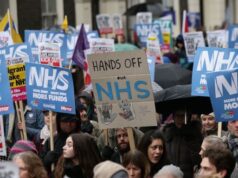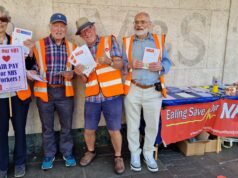Issue: 10
February 2014
This occasional newsletter is researched, written and edited by a group of concerned residents in Ealing, West London who want to preserve our NHS. We view the wholesale engagement of private, for-profit healthcare service suppliers as unnecessary, profligate and dangerous. Process improvement is what is needed in our NHS – not revolution.
In this issue:
+ More on Clause 118 – fascist/communist approach to NHS Decision Making
+ Blue Lights Still Flashing at A&Es
+ A&E Closure Offers No Help to Dying Baby
+ We Spend Less/Head than Other Countries on Government Health Spending
+ Want to give Atos Your Identifiable Medical Health records?
+ Will Chemists Replace or Augment GPs?
+ Mental Health Beds Nightmare
+ The People’s Inquiry for London’s NHS
+ England’s NHS in Numbers
+ No Smoking Anywhere for the Dying, those in Pain and Anxious Carers
+ Circle Private Healthcare on the Sick List
+Upcoming Events
Clause 118 Update
Clause 118 is a proposed amendment to the Health and Social Care Bill currently going through Parliament. It will effectively allow the Secretary of State for Health to close, merge or privatise any hospital willy-nilly. The sweeping new powers would mean that decisions about local hospital provision could be taken in as little as 40 days, regardless of how hospitals are performing. Absolute power will be granted to Trust Special Administrators (TSAs) to make these decisions without any requirement for community engagement or public consultation. A TSA would be brought in under the ‘Unsustainable Provider Regime’ to ride roughshod over local views and impose a reorganisation of any part of any Trusts in the vicinity of the ‘Failing Trust’.
Opponents of Clause 118 include the British Medical Association, the Royal College of Physicians, Save Lewisham Hospital, Unite, the GMB, Our NHS, Keep Our NHS Public, National Health Action Party, NHS Support Federation, GMB and Ealing TUC Save Our NHS Campaign.
A final vote in Parliament is due in February 2014.
Accident & Emergency Departments in England in Crisis
Dr Cliff Mann, President of the College of Emergency Medicine, says that there should be 260 new A&E Registrars each year, but over the last three years only half that number have been recruited.
Many A&E doctors are working at understaffed A&E departments throughout England. Mann describes these working environments as ‘intense, unremitting and increasingly unrewarding’. Doctors regularly work extended shifts and weekend shifts.
Ideas have been mooted for visitors to England, immigrants to England and English expatriates to pay for treatment at NHS Hospital A&E departments. So, as well as NHS A&E staff overnight on Friday and Saturdays nights cleaning up vomit, breaking up fights and episodes with drunks, drug addicts and the mentally ill, they will also have to act as surrogate immigration officials.
According to a poll conducted by ‘The Guardian’ newspaper 88% of GPs don’t believe that the 2004 GP contract changes have contributed to greater overcrowding in NHS A&E units. The changes meant that GPs no longer had to provide out-of-hours care. Jeremy Hunt has often cited the 2004 contract changes as a key contributor to current A&E overcrowding.
The Labour Party has calculated that spending on temporary locums in A&E in England is up 60% since 2009. £83 million was spent on A&E locums last year, with some temporary staff earning £1,500 per shift.
In January 2014 the NHS announced it would give more money to support A&E units. The money was originally to be spent by local NHS organisations to set up initiatives to reduce avoidable trips to A&E. According to ‘The Guardian’ very few of these schemes have been set up. Monitor, the NHS Regulator, will decide which A&Es get more cash and how much. Critics say that the current funding rules have deprived A&E units of £500 million a year.
Annual attendance at A&E units in England in 2003 was 16,516,845 and in 2013 it was 21,724, 841.
Two Year Old Boy Dies After Mother Rushes Him to Chase Farm Hospital A&E – Only To Find It Closed
A sick two year old boy – Muhammad Hashir Naveed – was rushed by his 27 year old mother Maryam to her local Chase Farm Hospital in Enfield at 3:00am on 15 January 2014. The Government closed this A&E unit on 9 December 2013 – but tragically Maryam did not know this. She frantically got a nurse on the phone and an ambulance was called. It took her son to Middlesex Hospital A&E in Edmonton some five miles away. However it was too late to save him and he died at 4:00am.
No-one knows whether the so called Urgent Care Centre (UCC) at Chase Farm Hospital could have saved Muhammad’s life. This is all a bit irrelevant though as the UCC closed for the night six hours before mother and baby arrived outside the defunct A&E building.
Are We Spending Too Little on Our NHS?
The World Health Organisation (WHO) has calculated the per capita spend (in $s) of Government spending on health. The UK rate at $2,919/head is way below the US at $4,437, The Netherlands ($3,991) and Denmark ($3,861). We also lag behind Austria, Germany, Switzerland, Canada, France and Belgium.
Do You Trust the Government Not To Sell Your Identifiable Personal Medical Records?
The Government wants us all to agree to our personal medical records being anonymised or ‘pseudonymised’ by civil servants and then sold off to anyone who wants to buy them. 26 million Government leaflets aimed at trying to persuade us all to go along with this have been printed and are now being delivered to households throughout England.
This data for sale will include personal data, including National Insurance Number, date of birth, mental health, cancer and substance abuse habit data. Prime potential data purchasers would be insurance companies, pharmaceutical giants and private healthcare suppliers.
The Government recently set up the Health and Social Care Information Centre (HSCIC) which will administer the data collection, pseudonymisation and sale of this data. Worryingly the HSCIC boasts a Public Assurance Director. Even he admits that with plenty of other data a third party could identify individual patients from the data supplied by HSCIC.
Also worryingly, the pseudonymisation software is being written by none other than Atos. The software and the service Atos will create and manage is grandly called the General Practice Extraction Service (GPES). Atos has been working on the software since early 2012. Atos is famous (or possibly infamous) as the software and service supplier for the much discredited Incapacity Benefit assessment service.
And just what is the Government’s recent track record in handling and managing people’s personal medical histories? In a word – disastrous. Prime Minister Blair’s ‘NHS National Programme for IT’ in 2000 had as one of its objectives the creation (in just three years) of a single electronic system for storing patient records in England which ultimately would be accessible 24/7 by anyone authorised to do so. What happened? The project lurched from crisis to crisis and was effectively abandoned massively unfinished in 2011 with a loss of at least £20 billion to the taxpayer.
And Now It’s Pharmacists Who Will Be Our NHS ‘Primary’ Care Entry Point
NHS England, The Royal College of GPs and Pharmacy Voice have proposed that NHS primary care triage should be carried out at your local Chemist’s.
However, Patient Concern is not happy with the idea that Pharmacists act as almost a ‘gatekeeper’ to conventional NHS Primary and Secondary Care.
Quite frankly, if we are unwell we need someone trained in healthcare – not in medicines – to carry out first contact diagnosis, prognosis and treatment. A severe headache could be treated with pain killers off the chemist’s shelf, but it could also require brain surgery. It’s unlikely that Pharmacists would be able to offer any ‘medicine’ to treat first contact mentally ill people.
However here at Ealing Hospital the A&E and other units will be wound down over the next six years. When seeing your GP might take days or a week; the NHS 111 telephone service response is slow or deficient; you are not Internet savvy or connected and can’t go online to NHS Choices, then many more ill people are likely turn to their local chemist to help them.
More on Shortages of NHS Mental Health Beds
The ‘Sunday Times’ has revealed results of research by the Royal College of Psychiatrists (RCP). It was stated that there were 32,000 mental health beds in England and Wales in 2004. ‘Community Care’ magazine has also revealed that in 2011/12 that number in England had dropped to 18,924.
The RCP says that the number of acute mental health beds currently available in the NHS in England has fallen by at least 1,700 since April 2011 – a drop of 9%.
Lack of locally available beds is resulting in treatment delays, and in some cases suicide. In other emergency cases mentally ill patients have variously travelled from Croydon to Hertfordshire, Kent to Somerset and Kent to Carlisle.
The RCP’s recommended maximum occupancy rate for acute psychiatric beds is 85%. Of the 28 Mental Health Trusts who responded to the research all reported occupancy rates of over 85%.
The Care Quality Commission (CQC) has revealed that the number of people detained for mental health treatment under the Mental Health Act was 50,408 in 2012/13. This represents a 14% rise over the five previous years from – 44,093 in 2008/9. CQC also criticised the fact that more than three quarters of wards in mental health hospitals were denying basic human rights such as patients’ use of the internet, use of a mobile phone and use of a secure outdoor space where they could smoke. Mind, Rethink Mental Illness and a group of MPs have all expressed their concern over these figures, the lack of staff and the implementation of the Goverenment’s laudable aspiration to give mental health ‘parity of esteem ‘ with physical health.
And in a January 2014 announcement worthy of inclusion in ‘Alice in Wonderland’, the Government stated that mental health patients are to have the same right to choose where they are treated as those with physical health problems. Let’s hope the mentally ill who live in Croydon choose to be treated in Hertfordshire and those in Kent continue to choose Somerset and Carlisle for their treatment.
The People’s Inquiry for London’s NHS
The People’s Inquiry is a unique, independent exercise in gathering and analysing many peoples’ views on and experiences in London’s NHS. Seven hearings were held across London over October, November and December 2013. At these meetings people presented verbal and written evidence. Funded by the Unite Union the inquiry is chaired by experienced NHS analyst Roy Lilley. The six person panel is currently reviewing and discussing the submissions of almost 100 people. A detailed response with recommendations is expected in March 2014.
An overview of the structure of the final report has been released and its headlines are:
- The financial squeeze
- The democratic deficit
- The Health & Social Care Act has made things worse
- The new bodies supposed to represent local people are weak and ineffective
- Management and staff are under pressure.
More at www.peoplesinquiry.org
England’s NHS in Numbers
+ 4,000 emergency doctors (Keep Our NHS Public –KONP)
+ 32,000 General Practitioners (KONP)
+ 26% of NHS doctors in England are foreign nationals (Health and Social Care Information Centre – HSCIC)
+ 34% of all UK- registered doctors were trained outside the UK (HSCIC)
+ 200 countries are the birth places of staff in the NHS and community health services in England (HISCIC)
+ 135,000 NHS beds in 2013/14 (KONP)
+ 297,000 NHS beds in 1987/88 (KONP)
+ 70% of all NHS contracts for services between April and December 2013 won by private firms (NHS Support Federation)
+ 80,000 – the number of mental health patients waiting 28 days or more for access to ‘talking therapies’ (HSCIC)
+ £105 billion – estimated cost to the economy due to mental health problems (researched by the Centre for Mental Health and quoted by Minister of State, Paul Burstow MP)
+ 211 – the number of Clinical Commissioning Groups (CCGs) in England
+ 152 – the number of Primary Care Trusts (PCTs) in England effectively replaced by CCGs in April 2013
NHS Addenbrooke’s Hospital in Cambridge is now No-Smoking Inside and Outside. Just How Helpful is this in Reducing Patient and Carer Stress Levels?
This is one of the biggest hospitals sites in the country with a large catchment area. For those seriously ill and for their stressed out carers, having a cigarette might be one of their few pleasures.
Circle’s Credibility Dented Yet Again by its Financial Difficulties and by the Competition Commission’s criticism of its Business Model
‘Private Eye’ had private healthcare services supplier Circle in its sights in January 2014. Circle made a loss of £9.7 million on 6 months sales of £44 million up to June 2013. Conventional debts of £60 million were declared to add to an estimated ‘Enron-esque’ off-balance-sheet (and off-shore) debt of £40 million.
On 27 January 2014 it was the turn of ‘The Times’ to report that the Competition Commission (CC) intended to crack down on schemes whereby doctors who refer private patients to particular hospitals are rewarded with either cash or shares. The CC cites Circle’s business model – the would-be ‘Big Society’ solution for medicine – as a non-compliant scheme. The CC wants to ban free secretarial services, free consulting rooms for doctors and a £500 limit of ‘freebies’ doctors can receive. These preliminary sanctions will be subject to consultation.
Circle, founded by a Goldman Sachs banker, is the only private healthcare supplier in England to be running an NHS hospital – Hinchingbrooke Hospital in Cambridgeshire. It also owns and runs its own private hospitals in Bath and Reading and runs the Urgent Care Centre at Ealing Hospital.




